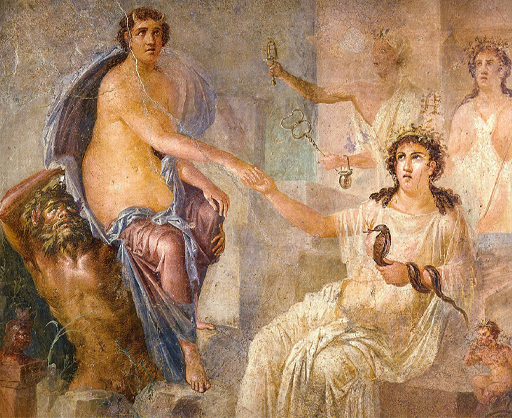1.4 Re-reading the first account (1.1.1–1.5.4)
Reading this first account, however, is more complicated than that. Next you’ll dig into it further to analyse how Herodotus presents the information.
Activity 5
Re-read the account with one simple question in mind: What does Herodotus tell us about where he got his information? Picking out phrases from each section (1–5), make a list of all the indications where a point of view is identified.
Herodotus, The Histories, Book 1 Sections 1–5
1.1
(1) Men skilled in arguments among the Persians say that the Phoenicians were the cause of the division. For these men (the Persians say) came from what’s called the Red Sea to our sea [the Mediterranean], and, once they had settled in the land in which they live to this day, they immediately began to embark on long voyages. They carried their Egyptian and Assyrian merchandise to many places before arriving in Argos. (2) Argos at this time was preeminent in every way in the land now called Hellas [Greece]. Arriving in Argos, (the Persians say) the Phoenicians set out their wares. (3) On the fifth or sixth day after they had arrived, when nearly all had been sold, there came to the seashore many women, chief among them the daughter of the king. Her name — and on this the Greeks say the same — was Io, daughter of Inachos. (4) As these women stood about the stern of the ship, bargaining for the wares that they had set their hearts on, (the Persians say) the Phoenicians incited one another to assault them. Most of the women escaped, but Io, along with some others, was abducted. Throwing her into the ship, the Phoenicians sailed off to Egypt.
1.2
(1) In this way Io arrived in Egypt, say the Persians (though not the Greeks), and that this was the first injustice done. After this, they say that some Greeks (the Persians aren’t able to recount the name) landed at Tyre in Phoenicia and abducted the king’s daughter Europa. (These Greeks would have been Cretans.) Up until now it had been like for like; but after this point it was the Greeks (the Persians say) who were guilty of the second injustice. (2) For Greeks sailed in a long ship down to Aea in Colchis and to the river Phasis; then, once they had completed the business on account of which they had come, (the Persians say) they abducted the king’s daughter Medea. (3) The king of the Colchians sent a herald to Greece to demand both a penalty for the abduction and his daughter back. But the Greeks (the Persians say) replied that, since those other men hadn’t paid any penalty for the abduction of Argive Io, nor would they pay a penalty to the Colchians.
1.3
(1) In the second generation after this, they say, Alexandros, the son of Priam, got to hear about these events and decided to get himself a wife by abducting one from Greece. He was completely convinced that he wouldn’t have to pay any penalty, since the others hadn’t. (2) So, he abducted Helen. The Greeks first resolved to send messengers to demand both Helen back and a penalty for the abduction. But, when these measures were proposed, they (the Trojans) brought up the abduction of Medea and the fact that they (the Greeks) wanted justice from others, though they had not paid any penalty or given up what had been demanded of them.
1.4
(1) Up until this point it was a matter only of abduction on both sides. But after this the Greeks (the Persians say) were the cause of an escalation: for the Greeks first launched an invasion against Asia before they launched one against Europe. (2) The Persians consider abducting women to be the act of unjust men, but seeking revenge, when an abduction has already happened, to be nonsensical. Level-headed people have no concern for abductions, for (the Persians say) it is clear that the women wouldn't have been abducted, had they not wanted it themselves. (3) The Persians say that for their part they made no account of the abductions of women. But the Greeks, on account of a single woman from Lacedaemonia [i.e. Helen of Sparta], gathered a massive army, came to Asia, and tore down the power of Priam. (4) Ever since then the Persians have considered the Greek to be an enemy. For the Persians think of Asia and the foreign peoples living there as their own, but Europe and the Greek people they consider separate from themselves.
1.5
(1) This is what the Persians say happened. And they trace the beginning of their hatred of the Greeks to the sack of Troy. (2) About Io, though, the Phoenicians do not agree with the Persians. For they say that they did not use force to carry her off to Egypt. Rather, she had sex with the captain of the ship while still in Argos. When she learned that she was pregnant, she was ashamed for her parents, and so she willingly sailed off with the Phoenicians before her shame became visible. (3) These are the things that the Persians and Phoenicians say. For my part, I’m not going to say whether these things happened in this or some other way. Rather, I’ll identify and speak about the person who I know first wronged the Greeks, as I march on farther into my account, going through both small and great cities alike. (4) For those cities that were once great have now become small, while those that were great in my time were before small. Knowing that human happiness doesn’t stay in the same place, I’ll mention both alike.
Discussion
You may have come up with something like the following list:
1.1
- Men skilled in arguments among the Persians say that
- (the Persians say)
- (the Persians say)
- — and on this the Greeks say the same —
- (the Persians say)
1.2
- say the Persians (though not the Greeks)
- they say
- (the Persians aren't able to recount the name)
- (These Greeks would have been Cretans.)
- (the Persians say)
- (the Persians say)
- (the Persians say)
1.3
- they say
1.4
- (the Persians say)
- The Persians consider
- (the Persians say)
- The Persians say that
- the Persians think
- they consider
1.5
- This is what the Persians say happened
- the Phoenicians do not agree with the Persians
- These are the things that the Persians and Phoenicians say
- For my part, I’m not going to say
- I’ll identify the man whom I know
- I'll mention
Again, don’t worry if you didn’t catch all these instances. The important point to note is that this opening account is mostly assigned to the Persians. You’re now going to consider the significance of this point for our reading of the text.
Activity 6
Think about two follow-up questions:
- What difference does it make that Herodotus represents his opening account as largely described from the perspective of another group (i.e. the Persians) rather than the Greeks?
- What other voices (aside from the Persians) are heard in the text and what difference do they make?
In both cases jot down in your own words the impact that identifying perspective has on your understanding of what’s going on.
Discussion
These are the points you may have observed:
- Knowing that this account derives from one group’s point-of-view affects what is recorded. We are being given a particular angle on the events, namely what the Persians think.
- Herodotus also records, at specific moments, the perspectives of others (the Greeks and the Phoenicians). Providing different points of view sets in relief the Persian line of thinking, particularly when those other accounts are said to be in disagreement (as with the Greeks at 1.2.1 or the Phoenicians at 1.5.2).
Different voices characterise this opening section of the Histories and invite different ways of responding to the events recorded. So, for example, when Herodotus observes that the Greeks agree on the name of Io (1.1.3), this passing note lends authority to the ongoing Persian account. It subtly shows that the ‘men skilled in arguments among the Persians’ have done their homework and attempted to align their thinking with Greek sources. Not that it makes it right. Capping this account, Herodotus pithily remarks: ‘In this way Io arrived in Egypt, say the Persians (though not the Greeks)’. The parenthesis equally subtly introduces a note of dissent. The Greeks have their own version of how Io ended up in Phoenicia, which is far more fantastical (see the Glossary entry for Io). At the end of the first episode as a whole, Herodotus introduces yet another account: the Phoenicians maintain that Io left of her own accord (1.5.2)! This new information contradicts the Persian account (not to mention the Greek version) and further complicates our reading of Io’s journey to Egypt. Which account do we agree with?


